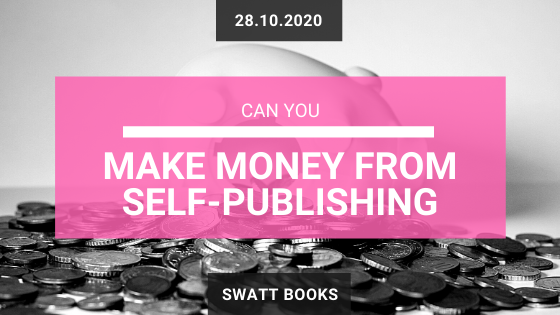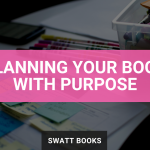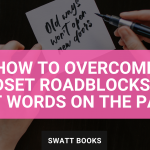Can you make money from self-publishing? It’s a question I hear a lot, especially from authors just starting out on their writing journey. It’s also the primary battle cry of those who are opposed to the idea of self-publishing as a viable route to becoming a published author. So, let’s explore the idea of making money from a self-published book using my own personal experience as a case study.
Since I published my book Stress-Free Self-Publishing: How to publish your own book without losing the will to live in May 2019, many people have asked me, “How many copies have you sold?” This is generally the measure of success that most people understand, and a target that most authors set for themselves. It’s a concrete figure that is non-arbitrary and can be used to compare the relative success of books across a wide range of subject and genres. It’s also a simple equation to work with when looking at making money: # of copies sold x £ sold for – printing, shipping & retailer discount = profit.
The problem lies in the inescapable fact that as a first-time author, it takes a lot of hard work and a generous dollop of good luck to sell a self-published book in large quantities. You’re fighting against the fact that no one knows who you are yet and are more than likely publishing a book of which there are already dozens if not hundreds already written on the same subject.
The good news is that the number of copies sold isn’t the only measure of publishing success, nor was it a particularly important metric for me.
As a self-publishing consultant, I understand the power that self-publishing a book can have on raising the credibility of an author. So, for me, publishing my book was about establishing my credibility and raising my profile within the author community. It was also about building awareness that there are people like me available to help budding indie authors to self-publish professionally, credibly and ethically. But how do you measure such abstract concepts against the cost of publishing a book; where does the money come from?
Let’s look at some quantifiable figures first. If I paid myself my standard rate to design, typeset and publish my book then Stress-Free Self-Publishing cost me £3,800 to publish in both paperback and eBook. This includes the services of a professional editor and cover artist. I invested a further £1,000 in my initial book launch which consisted of marketing materials, a paid and organic social media campaign, and organising a tour of networking events to launch the book to my core demographic of business owners.
During my four-week launch period, I sold 160 copies, which generated a return of £1,140. This meant that my launch campaign paid for itself. A great start, but what about my initial £3k investment to get the book published in the first place?
At the time that I released my book for distribution, I was working on five client books. By the time my launch campaign finished four weeks later I had 16 client contracts either signed or underway. That 300% growth worked out at roughly £29,000 in additional profit! Sure, some of those contracts would have been signed regardless of whether I published my book or not. However, a high proportion of them can be traced back to two factors.
Firstly, the increased marketing I created surrounding the book launch raised my profile exponentially. Marketing experts say that it takes around 7-10 ‘touches’ for your message to register on a person. That means someone needs to see or hear about you 7 to 10 times before your existence even registers with them for you to then start building the know like and trust factor required for them to feel comfortable enough to buy from you. People where seeing my name and my book on social media, they were hearing me on the radio, and people were talking about me and my book to their networks who were then talking about it to their networks, and so on. The increase in activity makes it easier and quicker to reach that 7-10 touch points.
Secondly, the content of the book raised awareness of the self-publishing services that I offer to authors. People don’t know what they don’t know. It’s very easy to lose sight of the fact that what seems be common knowledge to you as an expert if your field, is most likely completely unknown to someone without the benefit of your experience and knowledge. By sharing knowledge and content through not only books, but other forms of media, you establish yourself as the source of credible information which in turn builds more trust. The more people trust you, the more likely they are to buy from you. See where I’m going with this?
So, the long and sort of it is that self-publishing my book generated a return on investment of £26,000 within just four weeks of its publication, when looked at through the lens of new clients and contracts that I won as a result of publishing and marketing that book.
Now you may be thinking “that’s great for those 4 weeks that you’re launching a book, but I can’t publish a book every couple of months just to keep up that momentum”! The great thing with publishing is that it can have sustainable, long term benefits for both you and your business long after the book has been published.
My launch campaign for Stress-Free Self-Publishing finished at the end of June, which also happens to be my fiscal year end. The following financial year saw my business achieve 87% growth in income over the previous 12 months. 18 months after publication, that “spike” of new client contracts at the end of my launch campaign has become the new norm. I regularly have between 10-20 book projects live at any given time depending on the season. All it takes is a steady and consistent marketing strategy to maintain that new level. Nothing close to the marketing campaign I did during my launch or else people would get turned off, but just enough to subtly remind them that I have published a book on this subject and that I know what I’m talking about.
And that is where the real magic of self-publishing to support a business lies… in the increase in credibility, profile, reach and expert status that comes from publishing a professional quality book. It is possible to measure this impact, but not as quantifiably as profits. For example, as a result of my increased social media presence, both during my book launch and ongoing, I am being tagged on a regular basis in posts asking for publishing advice in Facebook groups – many from people I’ve never even met. This is proof that publishing a book about self-publishing has positioned me as the go-to expert on the topic. I am also being invited to speak at a variety of events, as well as being presented with opportunities to share my experiences and knowledge in articles and interviews. Most of which will convert into paying business in the future.
Publishing a book is seen by many experts as the perfect platform for promoting expertise and cementing credibility, just look at the successes of Robert Kiyosaki (Rich Dad, Poor Dad), Daniel Priestley (The Entrepreneur Revolution, Oversubscribed, and Key Person of Influence) and Richard Bolles (What Color is Your Parachute?). All of which were self-published at some stage.
Some people may assume that my experiences with my book are as a result of insider knowledge of the self-publishing industry. That my position as a self-publishing consultant affords me access to tips and tricks not available to the average self-publishing author. However, I have seen similar and, in many cases, even more astounding results from other self-published authors.
Still not convinced? Check out these entrepreneur authors who have gone on record to state their author earnings:
- Renda Derkson, the Canadian food blogger behind Bewitchin’ Kitchen, earns $3k CAD per month as a result of her self-published cookbook based on her favourite recipes from her blog.
- Michal Stawicki, author of the How to Change Your Life in 10 Minutes a Day series, publishes monthly income reports on his blog and earned an average of $3,150 USD per month over the past five months (40-50% of which are book royalties).
- Alyssa Padgett, an RV living blogger, is reported to earn about $200 USD a day after self-publishing her book A Beginner’s Guide to Living in an RV: Everything I Wish I Knew Before Full-Time RVing Across America.
- Joanna Penn, indie author and fellow publishing consultant, reported annual book sales income of $95k USD in 2016 which has only grown in line with the increase in her platform.
- Pat Flynn, entrepreneur and founder of Smart Passive Income, stated in a blog post that he earned $459k USD in direct and indirect income from his book Will It Fly? over a three-year period.
- Melyssa Griffin, a business blogger and prolific self-published author, reports monthly earnings of $200k-$300k USD.
- Timothy Sykes, a business & investment blogger and author of An American Hedge Fund, is reported to have earned between $15-$20 million USD in a single year according to an article in Forbes magazine.
Self-publishing is not for everyone; it involves dedication, hard work, vision, and planning. But if it looks like it might be for you and you approach the process in the right way – i.e. invest in the professional production and publication of your book, and integrate your book as a marketing tool for your wider business – then YES, you can earn money from self-publishing.
If you want more tips on HOW to earn more money from your self-published book, be sure to check out my blog post 5 Powerful Ways to Measure Self-Publishing ROI.





